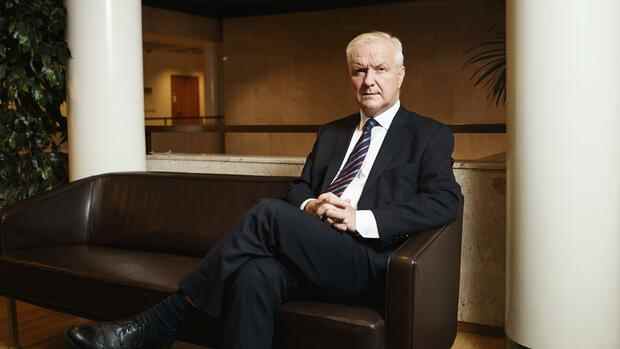The central banker expects “that the drivers of inflation will subside over the course of the year”.
(Photo: Bloomberg)
Frankfurt The head of the Finnish central bank, Olli Rehn, warns that Germany’s nuclear phase-out will increase dependence on Russia and destabilize the energy market. “The decisions about energy policy in Germany affect price fluctuations and thus the uncertainty about inflation,” said the ECB Governing Council member in an interview with the Handelsblatt. “For me, switching from coal to natural gas is not a green transition, and this transition phase will take a long time in Germany.”
Inflation in the euro area has risen to a record high, mainly due to expensive energy. In December, energy prices increased by 26 percent compared to the same period last year. Services and goods cost an average of 5.0 percent more than a year earlier.
Rehn expects “that the drivers of inflation will subside over the course of the year” and that the inflation rate in the euro area will be around two percent in the next two years. The further pace of the normalization of monetary policy in the euro area depends on the data.
“Personally, I expect the economic data to remain relatively good despite being affected by the Omicron variant.” For this reason, he thinks rate hikes in 2023 are “logical”, at least “if there are no new economic disruptions”. .
Top jobs of the day
Find the best jobs now and
be notified by email.
In the debate about the EU fiscal rules, the head of the Finnish central bank is calling for adjustments. The rules must be consistent, realistic and flexible at the same time. “A debt limit of around 60 percent of gross domestic product, as prescribed by the previous regulation, is clearly unrealistic.”
He pointed out that Italy’s post-pandemic debt ratio is expected to be around 160 percent. “If goals are unattainable, they will not achieve anything either.”
Holzmann: “We assume that inflation will fall”
The head of the Austrian central bank, Robert Holzmann, also considers the further development of inflation in the euro area to be very uncertain. “We all assume that inflation will fall,” he told the daily newspaper “Die Presse” in an interview published on Sunday. “The only question is, in what period of time?” Like Rehn, Holzmann is a member of the ECB Council, which makes monetary policy decisions in the euro area.
The original assumption was that there would be a calming down at the beginning of 2022 and then a sharp decline in the fourth quarter. “It cannot yet be ruled out that this will happen.” However, it is also not known “whether inflation will not remain at a high level for longer”.
From Holzmann’s point of view, so-called second-round effects – such as wage increases – are decisive. Some experts fear that workers will demand significantly higher wages due to a loss of purchasing power and that this could set in motion a wage-price spiral in which both factors reinforce each other. However, Holzmann sees “no corresponding signs” for this so far.
More: Lagarde rejects rapid turnaround in interest rates – December decisions in the ECB Council controversial

